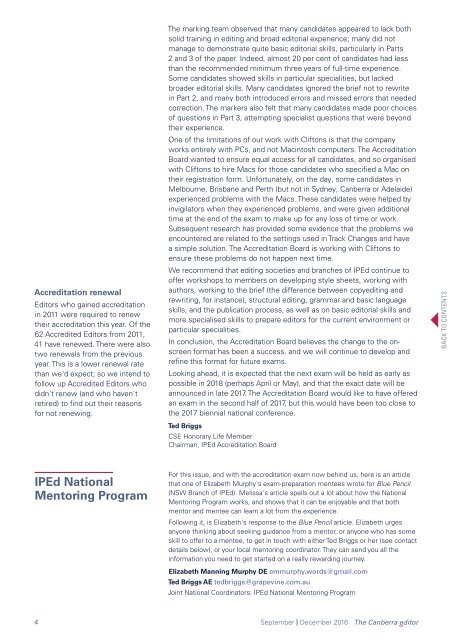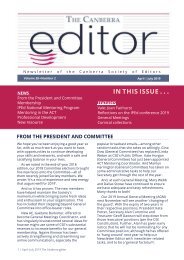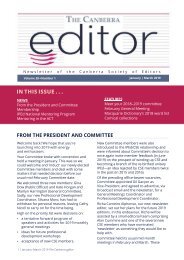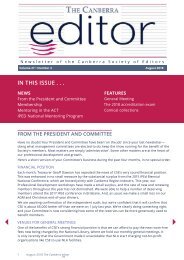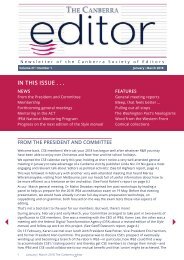The Canberr Editor: September-December 2016
Newsletter of the Canberra Society of Editors
Newsletter of the Canberra Society of Editors
- No tags were found...
Create successful ePaper yourself
Turn your PDF publications into a flip-book with our unique Google optimized e-Paper software.
Accreditation renewal<br />
<strong>Editor</strong>s who gained accreditation<br />
in 2011 were required to renew<br />
their accreditation this year. Of the<br />
62 Accredited <strong>Editor</strong>s from 2011,<br />
41 have renewed. <strong>The</strong>re were also<br />
two renewals from the previous<br />
year. This is a lower renewal rate<br />
than we'd expect; so we intend to<br />
follow up Accredited <strong>Editor</strong>s who<br />
didn't renew (and who haven't<br />
retired) to find out their reasons<br />
for not renewing.<br />
<strong>The</strong> marking team observed that many candidates appeared to lack both<br />
solid training in editing and broad editorial experience; many did not<br />
manage to demonstrate quite basic editorial skills, particularly in Parts<br />
2 and 3 of the paper. Indeed, almost 20 per cent of candidates had less<br />
than the recommended minimum three years of full-time experience.<br />
Some candidates showed skills in particular specialities, but lacked<br />
broader editorial skills. Many candidates ignored the brief not to rewrite<br />
in Part 2, and many both introduced errors and missed errors that needed<br />
correction. <strong>The</strong> markers also felt that many candidates made poor choices<br />
of questions in Part 3, attempting specialist questions that were beyond<br />
their experience.<br />
One of the limitations of our work with Cliftons is that the company<br />
works entirely with PCs, and not Macintosh computers. <strong>The</strong> Accreditation<br />
Board wanted to ensure equal access for all candidates, and so organised<br />
with Cliftons to hire Macs for those candidates who specified a Mac on<br />
their registration form. Unfortunately, on the day, some candidates in<br />
Melbourne, Brisbane and Perth (but not in Sydney, <strong>Canberr</strong>a or Adelaide)<br />
experienced problems with the Macs. <strong>The</strong>se candidates were helped by<br />
invigilators when they experienced problems, and were given additional<br />
time at the end of the exam to make up for any loss of time or work.<br />
Subsequent research has provided some evidence that the problems we<br />
encountered are related to the settings used in Track Changes and have<br />
a simple solution. <strong>The</strong> Accreditation Board is working with Cliftons to<br />
ensure these problems do not happen next time.<br />
We recommend that editing societies and branches of IPEd continue to<br />
offer workshops to members on developing style sheets, working with<br />
authors, working to the brief (the difference between copyediting and<br />
rewriting, for instance), structural editing, grammar and basic language<br />
skills, and the publication process, as well as on basic editorial skills and<br />
more specialised skills to prepare editors for the current environment or<br />
particular specialities.<br />
In conclusion, the Accreditation Board believes the change to the onscreen<br />
format has been a success, and we will continue to develop and<br />
refine this format for future exams.<br />
Looking ahead, it is expected that the next exam will be held as early as<br />
possible in 2018 (perhaps April or May), and that the exact date will be<br />
announced in late 2017. <strong>The</strong> Accreditation Board would like to have offered<br />
an exam in the second half of 2017, but this would have been too close to<br />
the 2017 biennial national conference.<br />
Ted Briggs<br />
CSE Honorary Life Member<br />
Chairman, IPEd Accreditation Board<br />
IPEd National<br />
Mentoring Program<br />
For this issue, and with the accreditation exam now behind us, here is an article<br />
that one of Elizabeth Murphy's exam-preparation mentees wrote for Blue Pencil<br />
(NSW Branch of IPEd). Melissa's article spells out a lot about how the National<br />
Mentoring Program works, and shows that it can be enjoyable and that both<br />
mentor and mentee can learn a lot from the experience.<br />
Following it, is Elizabeth's response to the Blue Pencil article. Elizabeth urges<br />
anyone thinking about seeking guidance from a mentor, or anyone who has some<br />
skill to offer to a mentee, to get in touch with either Ted Briggs or her (see contact<br />
details below), or your local mentoring coordinator. <strong>The</strong>y can send you all the<br />
information you need to get started on a really rewarding journey.<br />
Elizabeth Manning Murphy DE emmurphy.words@gmail.com<br />
Ted Briggs AE tedbriggs@grapevine.com.au<br />
Joint National Coordinators: IPEd National Mentoring Program<br />
4 <strong>September</strong> | <strong>December</strong> <strong>2016</strong> <strong>The</strong> <strong>Canberr</strong>a editor


